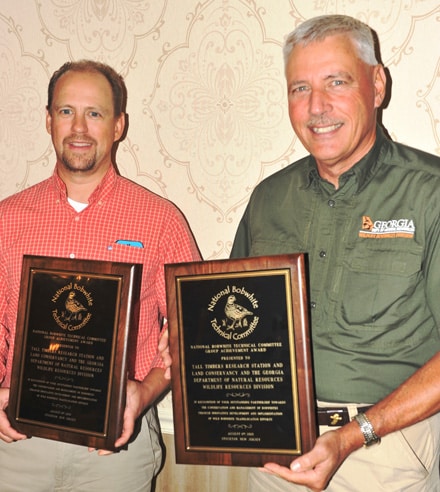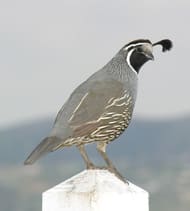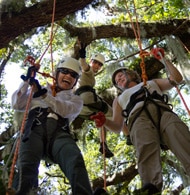
These coveted recognitions were presented for collaborative efforts in developing and successfully implementing the WRD Northern Bobwhite Quail Translocation Policy in focal areas of southwest Georgia and northern Florida, and maintaining over a century of bobwhite conservation.

Dr. Terhune, whose research with TTRS provided the scientific basis for the policy emphasized, “Suitable habit is the most important step to restoration success and must first be established before a translocation occurs.”
Development of the current translocation policy guidelines began in 1997, initiated by WRD and with input from TTRS based on research. The policy standards permit the translocation of wild bobwhites from private land with high density populations to lands with newly developed high quality habitat (1,500+ acres) and ongoing management that have low density bobwhite populations. The policy was finalized in 2006, and since that time Georgia has participated in the movement of 1,275 birds to five properties. Through this policy and the efforts of TTRS working with dedicated private landowners, bobwhites have been restored across 18,700 acres.
The Legacy Landscape for quail lies in the Red Hills portion of the Albany/Red Hills region between Thomasville and Tallahassee, while the Albany portion is located on the Dougherty Plain in southwest Georgia. This region is a unique, diverse landscape of expansive pine savanna harboring the largest bobwhite population in the southeastern U.S., with populations sustained at high densities across a contiguous managed landscape. More than 700,000 acres are managed across more than 200 properties using frequent prescribed fire to mimic and restore the natural fire history. This is the only region in the Southeast that has consistently applied prescribed fire to the land in natural frequency for over 100 years and it is home to the best quality remnants of old-growth longleaf pine forests. Additionally, the region has nearly a century of bobwhite research which continues today.
For more details on bobwhite research and management, visit the following websites: www.georgiawildlife.com/conservation/quail; www.bringbackbobwhites.org; www.ttrs.org.
Going Up: Southeastern tree climbing workshop scheduled for Charlie Elliott Wildlife Center

“Although this is a regional workshop that likely will attract climbers from the Southeastern U.S., it is open to any tree climber from anywhere,” said Bill Maher, vice president of the Global Organization of Tree Climbers. “A goal of this workshop is to encourage climbers to go home and find ways to work with local, state or national agencies in their area.”
Attendees can expect the following types of opportunities at the weekend workshop, to improve climbing skills and wilderness ethics, meet other outdoor professionals interested in recreational tree climbing, canopy research and climb with like-minded individuals. Additionally, Charlie Elliott offers such activities as shooting sports, fishing, miles of hiking trails, world-class birding and wildlife watching opportunities.
Other potential activities include practicing canopy rescue scenarios, canopy research projects and checking out Project Adventure’s on-site challenge course.
The weekend workshop is sponsored by the Georgia Department of Natural Resources’ Wildlife Resources Division, the Global Organization of Tree Climbers, and Tree Stuff.
Fees for this workshop, which include lodging, meals and all activities, are $210 per person. If camping (and bringing own camping equipment), the cost is $170 and includes meals and activities. A Saturday-only option is available for $20 and includes activities and lunch. Preregistration is required.
Charlie Elliott Wildlife Center, named for the first director of what is now the Wildlife Resources Division, offers outdoor activities such as hunting, fishing, shooting and birding along with educational programs and a conference center, banquet hall and hotel-styled lodging, all within an hour’s drive of Atlanta. The 6,400 acres include Marben Public Fishing Area and Clybel Wildlife Management Area.
For more information or to register, please contact Jody Rice at 770-784-3062 or at jody.rice@dnr.ga.gov.
For more information on the Charlie Elliott Wildlife Center, visit www.georgiawildlife.com/CharlieElliott

